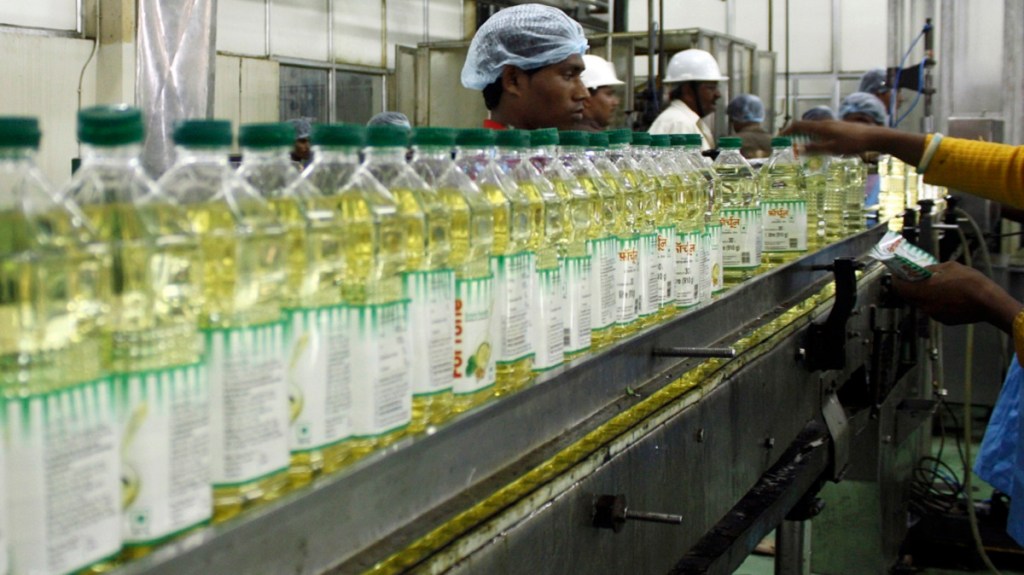FMCG major Adani Wilmar‘s fiscal net profit tumbles 60.1 per cent to Rs 93.61 crore from Rs 234.29 crore in the same quarter last year. The FMCG company posted a revenue from operations of Rs 13,872.64 crore, down 7 per cent from Rs 14,917.26 crore in Q4FY22, due to fall in prices of edible oil. The company’s EBITDA stood at Rs 358.7 crore. However, Adani Wilmar said that the company recorded 15 per cent volume growth in the fourth quarter of FY23 led by food and oleochemicals businesses. On an annual basis, Adani Wilmar recorded 14 per cent growth in volume and 7 per cent growth in revenue for the financial year 2023.
“Our margins during the quarter and full year got impacted by high-cost inventory in a falling edible oil price environment, inflation impact on our operational costs and an increase in interest costs due to rate hikes,” said Angshu Mallick, MD & CEO, Adani Wilmar Limited.
What led to profit fall for Adani Wilmar?
Adani Wilmar maintained that TRQ disparity leading to pressure on its Soyabean oil margins, decline in edible oil prices in Q4, inflation impact on packaging cost at gross profit level and inflation in logistics, chemicals, and power & fuel costs at the EBITDA level, among other factors led to Q4 profit fall. It added, “Interest expenses went up with the increase in the benchmark rates on the back of hike in the Fed rates.” Also, Adani Wilmar got better margins in Sunflower and other soft oils due to the bullishness in the market after the start of the Ukraine conflict during Q4FY22.
Adani Wilmar’s segment wise performance
While the edible oil business recorded a revenue of Rs 10,789.75 crore in Q4FY23, food & FMCG business accounted for Rs 1,159.01 crore, and industry essentials business posted a revenue of Rs 1,923.88 crore. “The edible oil segment’s branded sales volume grew by 4 per cent during the quarter, on the back of good consumer demand due to softened edible oil prices. However, overall oil sales volume was dragged down due to lower demand from the bakery and frying industry,” the company said. In the food & FMCG segment, Adani Wilmar said, its top product categories including wheat flour and rice have been growing well. “The Company continues to leverage the brand equity of the recently acquired premium basmati brand Kohinoor. This has also helped in consolidating the market share in the rice segment,” Adani Wilmar said in the regulatory filing. Meanwhile, the Oleochemicals business has been growing on the back of new capacity of Oleo commissioned in Q3 FY2021, along with a stable demand. “Despite the decline in export volume of castor oil for the industry, AWL’s overall castor business grew in double digits in volume terms in Q4FY23,” it said.
“We have almost doubled our Food & FMCG revenues in 2 years and recorded Rs 4,000+ crores revenue in the segment. Both of our key products – wheat flour, (including SRM – Sooji, Rawa & Maida) and rice have crossed Rs 1,000 crores of revenues during the year. In edible oil, branded sales, with 75 per cent saliency, we have done significantly better with 8 per cent YoY volume growth in FY ’23,” said Angshu Mallick.
Adani Wilmar’s preferred retail channels
Adani Wilmar reported a strong volume growth of ~23 per cent YoY in FY23 through its retail channels including e-commerce, modern trade, e-B2B serving general trade. “In FY23, these channels contributed ~Rs 2,700 crores of revenue for the Company,” it said. Adani Wilmar is also working towards expanding more in the rural towns of India and for the existing markets, the FMCG company is focusing on increasing retail penetration and improvement in sales productivity.

